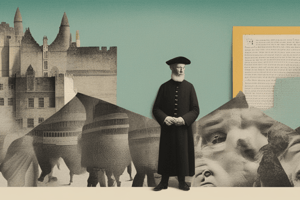Podcast
Questions and Answers
Who are some key figures in liberal thought?
Who are some key figures in liberal thought?
- Simone de Beauvoir, Carol Gilligan, Judith Butler
- Karl Marx, Friedrich Engels, Vladimir Lenin
- Immanuel Kant, John Rawls, Martha Nussbaum
- John Locke, John Stuart Mill, David Hume (correct)
What is a central characteristic of liberalism?
What is a central characteristic of liberalism?
- Advocacy for strong government control
- Advocacy for complete economic control by government
- Emphasis on community rights
- Emphasis on individual rights and freedoms (correct)
Which branch of political theory critiques traditional thinking from a gender perspective?
Which branch of political theory critiques traditional thinking from a gender perspective?
- Liberalism
- Justice theory
- Neoliberalism
- Feminism (correct)
Who are some notable feminist theorists according to the text?
Who are some notable feminist theorists according to the text?
Which movement advocates for limited government intervention in economic affairs?
Which movement advocates for limited government intervention in economic affairs?
Who are some key figures in the field of ecophilosophy?
Who are some key figures in the field of ecophilosophy?
What aspect does cultural politics focus on?
What aspect does cultural politics focus on?
Which political theorist is associated with the concept of formal and substantive equality?
Which political theorist is associated with the concept of formal and substantive equality?
Political aesthetics examines the role of __________ in shaping political attitudes and policy.
Political aesthetics examines the role of __________ in shaping political attitudes and policy.
Which group of thinkers focuses on citizens' engagement in democratic decision-making processes?
Which group of thinkers focuses on citizens' engagement in democratic decision-making processes?
Study Notes
Introduction
Political theory is the branch of philosophy concerned with the analysis of political affairs, political practices, and related subjects. It encompasses various branches of thought such as liberalism, conservatism, feminist theory, ecological politics, and deliberative democracy. This article aims to provide an overview of political theory, its branches, and the authors who have contributed significantly to the field.
Branches of Political Theory
Liberalism and Neoliberalism
Liberalism is characterized by its emphasis on individual rights and freedoms, limited government, and market capitalism. Key figures in liberal thought include John Locke, John Stuart Mill, and David Hume. The neoliberal movement, which emerged after World War II, advocates for limited intervention from government in economic affairs.
Justice
The concept of justice is central to political theory, with theories such as utilitarianism, consequentialism, and deontology providing frameworks for understanding what constitutes just actions and policies. Prominent thinkers in this area include Immanuel Kant, John Rawls, and Martha Nussbaum.
Feminism
Feminist theory critiques traditional political thinking from a gender perspective and argues that women's experiences and interests should be taken into account. Notable feminist theorists include Simone de Beauvoir, Carol Gilligan, and Judith Butler.
Ecophilosophy
Ecophilosophy explores human relationships with the natural world and the ethics of environmental policy. Key figures in this area include Arne Naess, Aldo Leopold, and Val Plumwood.
Cultural Politics
Cultural politics focuses on the role of culture in shaping political attitudes and behaviors. Notable thinkers in this area include Edward Said, Gayatri Chakravorty Spivak, and Stuart Hall.
Equality
Equality in political theory refers to both formal equality under law and substantive equality of opportunity and outcome. Key figures in this area include John Rawls and Thomas Paine.
Politics and Aesthetics
Political aesthetics examines the role of artistic expression in shaping political attitudes and policy. Figures in this area include Jacques Rancière and Friedrich Nietzsche.
Deliberative, Agonistic, and Ancient Democracy
These approaches focus on how citizens engage in democratic decision-making processes. Key thinkers in this area include Hannah Arendt, Carl Schmitt, and Plato.
Language
Theories of language in political thought include those by Jacques Derrida, Michel Foucault, and Ferdinand de Saussure.
Conclusion
Political theory is a rich and diverse field that draws upon philosophical, ideological, and methodological perspectives to analyze contemporary political issues and historical problematicstitles. It covers topics ranging from the nature of justice, democracy, and governance to the cultural aspects of politics and the relationship between humans and their environment. The works of many influential scholars, including Dennis Thompson, James Tully, Michael Walzer, Stephen K. White, Robert Paul Wolff, Linda Zerilli, Banu Bargu, Kevin Olson, Massimiliano Tomba, Nancy Luxon, Bart Feberwee, Glen Coulthard, Juliet Hooker, Pratap Bhanu Mehta, Nivedita Menon, among others, contribute to our understanding of these complex issues.
Studying That Suits You
Use AI to generate personalized quizzes and flashcards to suit your learning preferences.
Description
Explore the diverse branches of political theory such as liberalism, feminism, ecophilosophy, justice, and cultural politics. Learn about key figures like John Rawls, Judith Butler, and Hannah Arendt who have made significant contributions to the field. Delve into the connections between political philosophy, ethics, governance, and societal issues.




